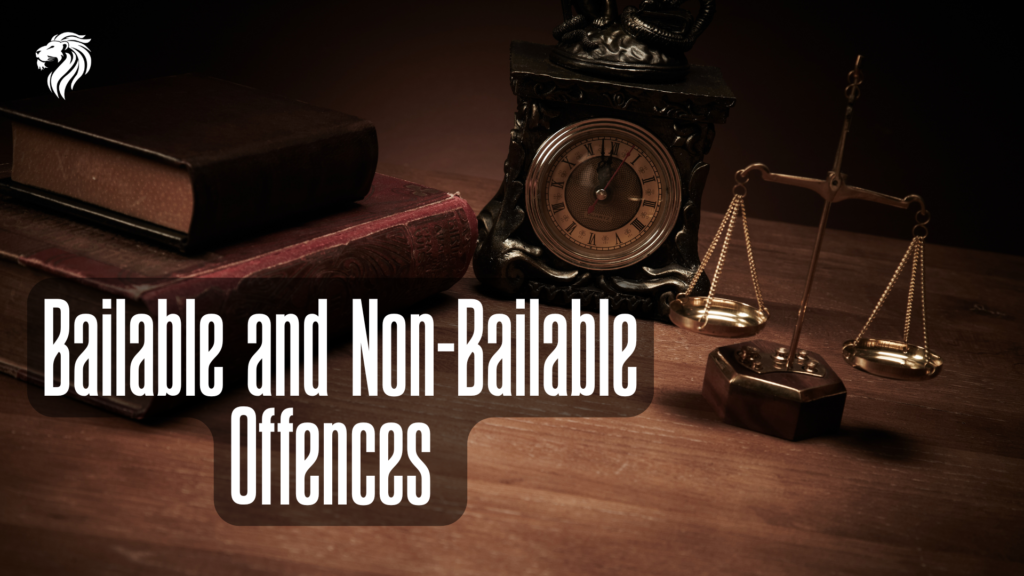Difference Between Bailable and Non-Bailable Offences – Explained Simply
If you’ve ever heard someone say, “Is it a bailable offence or not?”, you’re not alone. Many people get confused about what exactly these legal terms mean. But don’t worry—we’re here to simplify it for you!
Whether you’re someone facing a legal situation, a law student, or just curious, understanding the difference between bailable and non-bailable offences is important.
Let’s decode it in a super simple way!
🔍 What is a Bailable Offence?
A bailable offence is a criminal offence where you have the legal right to get bail.
💡 Meaning?
It means the court or even the police officer in charge must grant bail if you apply for it.
🧾 Common Examples of Bailable Offences:
- Causing simple hurt (Section 323 IPC)
- Public nuisance
- Cheating (minor)
- Defamation
- Driving rashly but without serious injury
👉 These are usually less serious crimes with lesser punishment.
🚫 What is a Non-Bailable Offence?
On the other hand, a non-bailable offence is more serious in nature. Here, bail is not a right, but a decision of the court.
💡 So, can you get bail?
Yes, but only if the court allows it, considering the seriousness of the case, risk to society, or likelihood of the accused absconding.
🧾 Common Examples of Non-Bailable Offences:
- Murder (Section 302 IPC)
- Rape (Section 376 IPC)
- Dowry death
- Kidnapping
- Attempt to murder
👉 These offences usually have severe punishments and impact public safety.
⚖️ Key Differences: Bailable vs Non-Bailable
| Aspect | Bailable Offence | Non-Bailable Offence |
|---|---|---|
| Right to Bail | Yes – Bail is a matter of right | No – Depends on court’s discretion |
| Severity | Less serious | More serious |
| Examples | Minor hurt, defamation | Murder, rape, kidnapping |
| Handled by | Police can grant bail | Only magistrate or judge can grant bail |
| Arrest Warrant | Usually not required | Usually required |
🚨 Why This Matters to You
- If you or someone you know is accused of a crime, knowing the type of offence determines how quickly bail can be arranged.
- It also helps families prepare legally and financially.
- If you’re in Aligarh, consult a reliable Aligarh criminal lawyer for expert legal support.
✅ Pro Tip:
If you’re ever confused about whether an offence is bailable or not, check the First Schedule of the Indian Penal Code or consult your legal expert.
❓ FAQs
1. Can I get bail for a non-bailable offence?
Yes, but only if the court believes it is justified.
2. Who decides if an offence is bailable?
The classification is given in the Indian Penal Code (IPC).
3. Is there a list of bailable offences?
Yes. The First Schedule of CrPC lists them.
4. What should I do if I’m arrested?
Immediately consult a criminal lawyer, preferably someone local like an Aligarh criminal lawyer if you’re based there.
🔚 Final Thoughts
Legal terms can feel overwhelming, but knowledge gives you power. Now that you understand the difference between bailable and non-bailable offences, you’re already ahead.
Need legal help? Always speak to a professional criminal lawyer for accurate advice and representation.
Stay aware, stay safe.
How I Can Help
With over three decades of legal experience, I have represented individuals across various legal matters, ensuring justice and the best possible outcomes. Every case is unique, and I approach each one with personalized strategies to protect my client’s rights.
Need Legal Assistance? Let’s Talk.
If you have a legal issue or need expert advice, don’t wait. Contact me today to discuss your case and explore the best legal solutions.
📞 Call Now: +91-7520404411
📍 Visit My Office: Chamber 7, in front of CJM Court, Aligarh, Uttar Pradesh 202001
